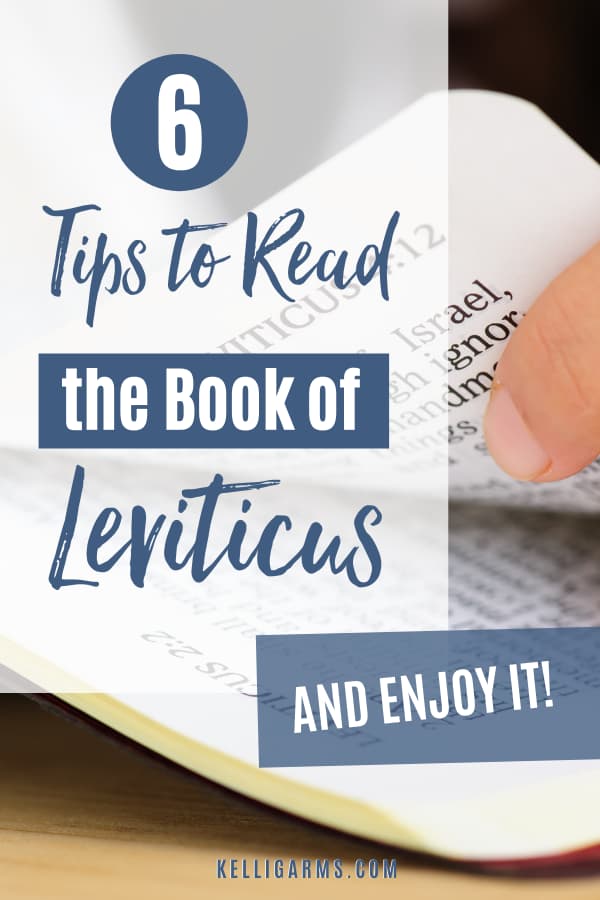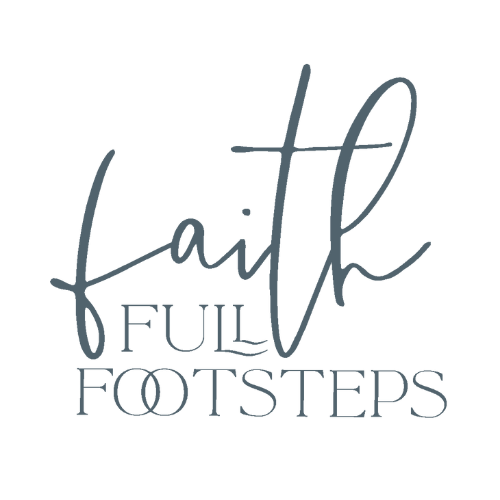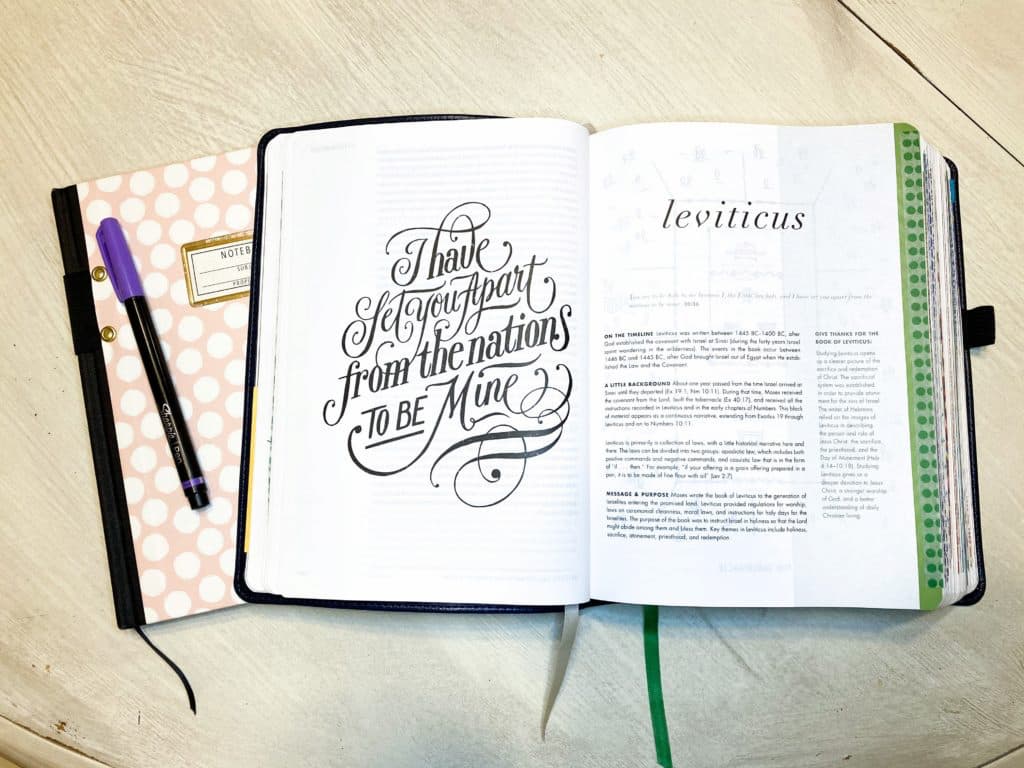I can’t tell you how many times I have planned to read the Bible all the way through only to be derailed when I hit the book of Leviticus. What makes the book difficult is the detailed steps of sacrifices, instructions for handling dead bodies, and lists of clean and unclean animals and activities. As Christians, we know we are supposed to read all the parts of the Bible because it is God’s love letter to humanity, but it can be hard to push through.
This year, when I got to Leviticus, I armed myself with some tools. Not only did I make it through the book, but I actually enjoyed it and finished the book with a deeper understanding of its value and importance. Now I want to share those tools with you. These tools are not in any particular order.
Pull Back on Application
It is a pretty modern idea that knowledge is pointless without application. This has brought on a trend of trying to apply every passage we read in the Bible to our lives at this moment. The applications seem to come easily when we are reading Paul’s epistles, but Leviticus is a little harder to apply. Because it contains laws for sacrifices and rituals we don’t practice today, it can seem pointless for us to put in the effort to understand the book.
But our purpose in reading the Word is not application. I’m not saying it doesn’t apply to our lives, but that should not be our focus. We should be reading the Bible to get to know God. As we read through any book of the Bible, we should be looking for clues about God’s character.
In Leviticus, we should be looking specifically for God’s holiness, His mercy, and His grace as He provides a way for Him to dwell among His people.
Consult a Bible Handbook or Study Bible
Because there are many laws that seem so strange to us, a Bible handbook or the notes in a study Bible can be very helpful as you make your way through the book of Leviticus. You could also use a website like blueletterbible.org (also available as a free app) if you don’t have a study Bible or simply want another tool.
You need to find basic information like who wrote the book? When was it written? To whom was it written? What time period does it span? The answers to these questions will hopefully spur other questions and clarify some things as you get into the book. When you come to a confusing passage, use the notes in the handbook or study Bible to find clarification. Often the explanation is simple but foreign to our modern, western culture.
One of the interesting details you can learn from a tool like this is that the title of the book means “things concerning the Levites.” This makes sense as you start reading about the sacrifices and the feasts over which the Levites preside. You can also use these tools for word study, which takes us to the next tip.
Define Your Terms
There are repeated terms in the book of Leviticus that need some context because we might understand them differently today than they were meant when written or translated. There are also words we need to define because they are words we just don’t use in everyday conversation. Understanding these terms can change the way we read the passage.

For example, the terms “clean” and “unclean” that show up repeatedly in Leviticus have nothing to do with hygiene or being dirty. Most times they don’t even refer to sinfulness. Instead, they refer to a ritual state. In other words, being “unclean” means the person cannot participate in a ritual. Many of the things that are listed as “unclean” are completely out of the control of the person, so they aren’t related to sin.
Other words to look up include:
- Atonement
- Holy
- Sacrifice
- Priest/Priesthood
- Purity
Because my goal is always to encourage you to study the Word for yourself, I want to leave these words for you to look up on your own. A great resource is blueletterbible.org. You can do a word study by finding a verse with the word in it, clicking on “tools,” and finding the Strong’s Concordance number. There you will find not only definitions, but also other verses that use the same word in the original language so you can compare how the word was translated and gain a deeper understanding of its overall meaning.
Look for God the Father and Son
Our goal in reading any book of the Bible is to learn who God is. Leviticus is no different. When you read the book of Leviticus, look for God. God was making a way for His people to come to Him.
God cannot be in the presence of sin. Therefore, He cannot dwell among sinful people. But He wants to dwell with us. He wants to take part in our lives. So He created a way for that to happen. Everything in the book of Leviticus is for this purpose. It is Him making a way for His people to come to Him so He can dwell among His people.
When we get to the New Testament, we will see how Christ takes the place of all of the rituals and sacrifices described the book of Leviticus, so the book of Leviticus gives us a glimpse into what Christ has done for us in order to shatter the distance between us and God. The book of Hebrews complements Leviticus by showing us how Christ fulfills the demands of Leviticus.
Sacrifice: Hebrews 7:27, 9:26, 10:12
“He has no need, like those high priests, to offer sacrifices daily, first for his own sins and then for those of the people, since he did this once for all when he offered up himself.”
Hebrews 7:27
Priest: Hebrews 5:5-6, 2:17, 3:14, 4:14
“Therefore he had to be made like his brothers in every respect, so that he might become a merciful and faithful high priest in the service of God, to make propitiation for the sins of the people.”
Hebrews 2:17
Pure: Hebrews 7:26, 9:12
“For it was indeed fitting that we should have such a high priest, holy, innocent, unstained, separated from sinners, and exalted above the heavens.”
Hebrews 7:26
Surrounding Nations
Israel had just spent 400+ years in Egypt surrounded by Egyptian gods and Egyptian rituals and ceremonies. Now they were surrounded by many pagan nations who practiced religious rituals intended to appease their man-made gods. Because we are created to worship, God laid out the rules for His worship so the Israelites would not follow in the practices of those around them. So while many of the laws prohibited things that weren’t wrong in and of themselves, because they were used in ceremonies to false gods, the Israelites were not to participate. Some of the practices of the surrounding nations were definitely contrary to God’s character, like child sacrifices to Molech, and they are specifically called out by God and forbidden of the Israelites.
The goal was for God’s people to look different than other nations. God wanted the surrounding people to notice. Israel didn’t have a pharaoh or a king. Their ruler was God. As a result, they did things differently. God’s people are always supposed to look different than the world because we are set apart.
Note Repetition
The last thing I will mention, though I know this list is not exhaustive, is the most obvious. If God says something once, it is important. If God says the something multiple times, you need to pay attention. When you start to notice a phrase or sentence that is repeated multiple times, I recommend you take note by picking a highlighter color and marking that phrase in that color every time you come across it. (If you are opposed to writing in your Bible, you could print out a copy of the book and mark it up instead or track the instances of the repeated phrase in a journal.) This will give you a visual of the repeated phrases and help you understand why they are there.
An example from my reading includes the repeated phrase “I am the LORD” and “I am the LORD your God.” This phrase appears after every command given in chapter 19. It reminds me of a parent giving instructions to her child and ending each one with “I am your mother” as that is the only explanation needed to compel the child to obey.
I pray these tips will alleviate your fear of the book of Leviticus and help you come away from the book with a renewed sense of awe as you discover more about God. Spending time in the Word should never be approached as a punishment or requirement but should instead be approached with excitement and anticipation. These tips helped me look forward to reading Leviticus and brought me a deeper understanding of its importance.
If you apply these tips to your reading of the book of Leviticus, I would love to know how it goes for you!
For Further Reading:
If you would like to know how to study the Bible on your own without having to depend on anyone else to tell you what it means, download my FREE workbook below.






This was such a helpful framework as I prepare to read this book! Thank you!
I’m so glad it was helpful!